University Nursing: Palliative Care and Cultural Considerations
VerifiedAdded on 2022/08/27
|7
|1750
|21
Essay
AI Summary
This essay provides a reflective analysis of palliative care, focusing on the case of a 20-year-old patient with renal failure. It explores the transition from cure-focused to comfort-focused care, emphasizing ethical decision-making, cultural sensitivity, and the role of the registered nurse. The discussion covers collaborative ethical frameworks, including beneficence, autonomy, and justice, and addresses potential ethical dilemmas. Cultural aspects, particularly for an aboriginal patient, are examined, highlighting the importance of culturally sensitive care and the integration of family wishes. The essay also reflects on the nurse's personal experiences, professional interactions, and strategies employed to provide therapeutic care and support to the patient and family. It concludes with the importance of balancing ethical and cultural competence in end-of-life care and the value of therapeutic touch.
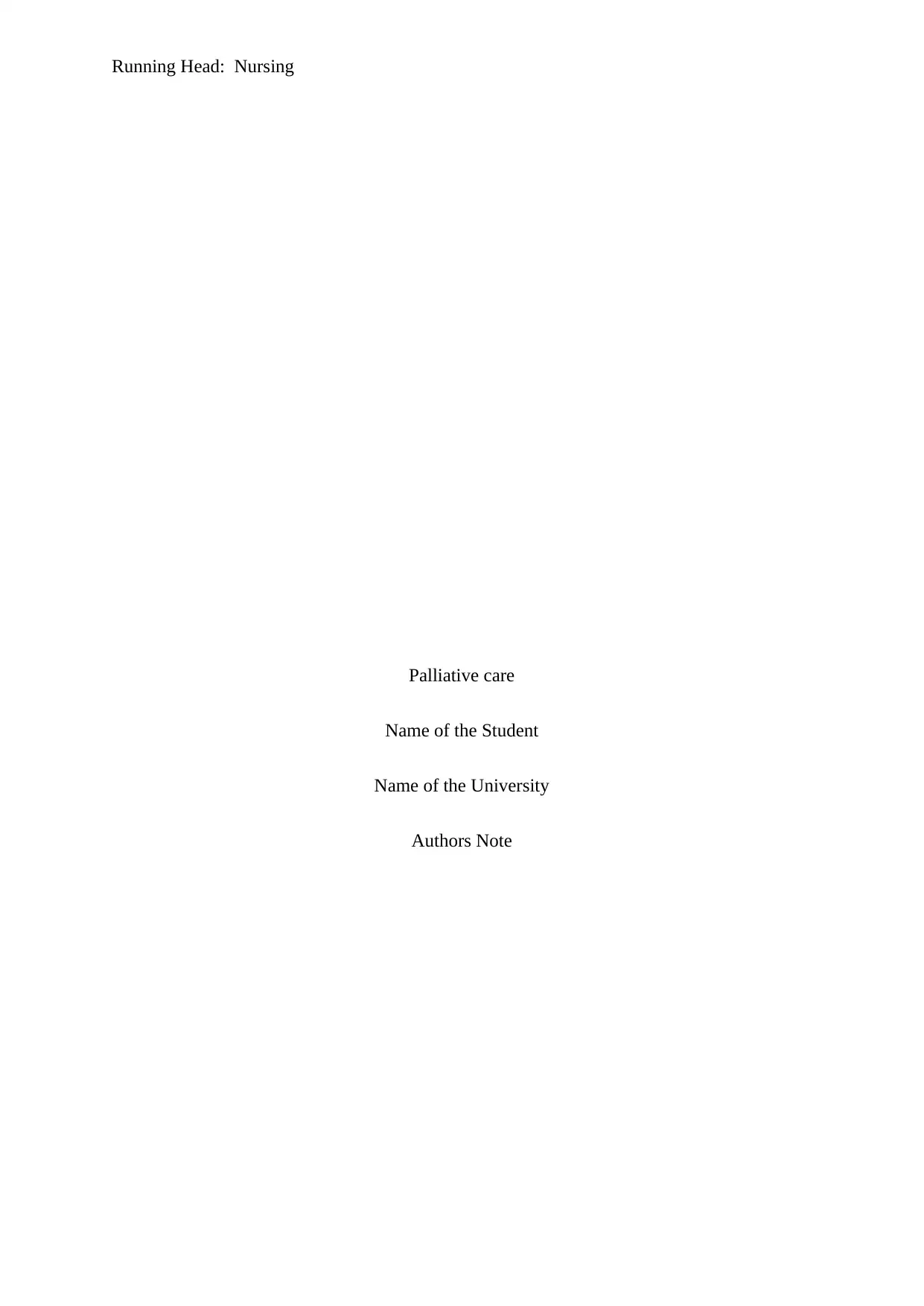
Running Head: Nursing
Palliative care
Name of the Student
Name of the University
Authors Note
Palliative care
Name of the Student
Name of the University
Authors Note
Paraphrase This Document
Need a fresh take? Get an instant paraphrase of this document with our AI Paraphraser
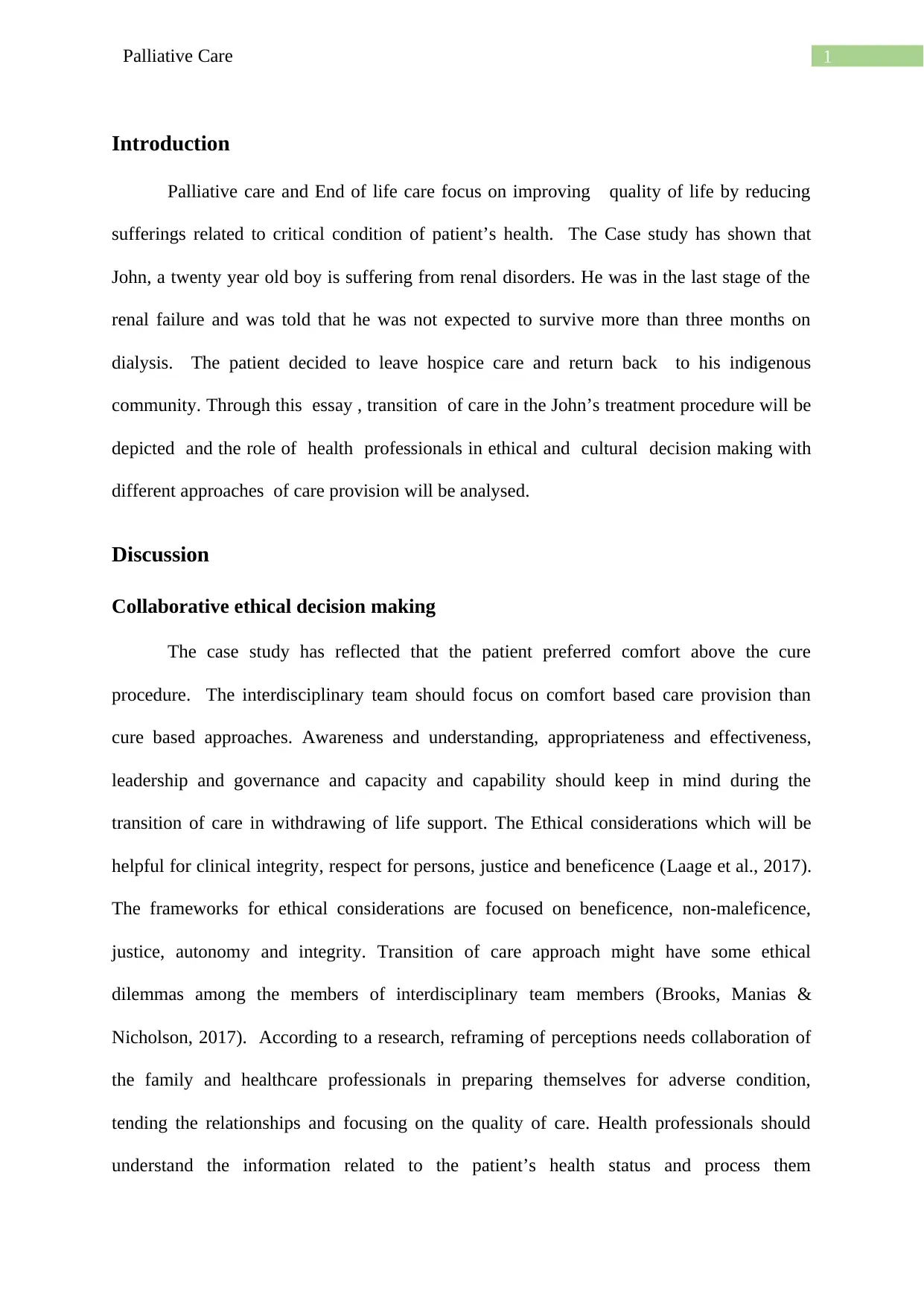
1Palliative Care
Introduction
Palliative care and End of life care focus on improving quality of life by reducing
sufferings related to critical condition of patient’s health. The Case study has shown that
John, a twenty year old boy is suffering from renal disorders. He was in the last stage of the
renal failure and was told that he was not expected to survive more than three months on
dialysis. The patient decided to leave hospice care and return back to his indigenous
community. Through this essay , transition of care in the John’s treatment procedure will be
depicted and the role of health professionals in ethical and cultural decision making with
different approaches of care provision will be analysed.
Discussion
Collaborative ethical decision making
The case study has reflected that the patient preferred comfort above the cure
procedure. The interdisciplinary team should focus on comfort based care provision than
cure based approaches. Awareness and understanding, appropriateness and effectiveness,
leadership and governance and capacity and capability should keep in mind during the
transition of care in withdrawing of life support. The Ethical considerations which will be
helpful for clinical integrity, respect for persons, justice and beneficence (Laage et al., 2017).
The frameworks for ethical considerations are focused on beneficence, non-maleficence,
justice, autonomy and integrity. Transition of care approach might have some ethical
dilemmas among the members of interdisciplinary team members (Brooks, Manias &
Nicholson, 2017). According to a research, reframing of perceptions needs collaboration of
the family and healthcare professionals in preparing themselves for adverse condition,
tending the relationships and focusing on the quality of care. Health professionals should
understand the information related to the patient’s health status and process them
Introduction
Palliative care and End of life care focus on improving quality of life by reducing
sufferings related to critical condition of patient’s health. The Case study has shown that
John, a twenty year old boy is suffering from renal disorders. He was in the last stage of the
renal failure and was told that he was not expected to survive more than three months on
dialysis. The patient decided to leave hospice care and return back to his indigenous
community. Through this essay , transition of care in the John’s treatment procedure will be
depicted and the role of health professionals in ethical and cultural decision making with
different approaches of care provision will be analysed.
Discussion
Collaborative ethical decision making
The case study has reflected that the patient preferred comfort above the cure
procedure. The interdisciplinary team should focus on comfort based care provision than
cure based approaches. Awareness and understanding, appropriateness and effectiveness,
leadership and governance and capacity and capability should keep in mind during the
transition of care in withdrawing of life support. The Ethical considerations which will be
helpful for clinical integrity, respect for persons, justice and beneficence (Laage et al., 2017).
The frameworks for ethical considerations are focused on beneficence, non-maleficence,
justice, autonomy and integrity. Transition of care approach might have some ethical
dilemmas among the members of interdisciplinary team members (Brooks, Manias &
Nicholson, 2017). According to a research, reframing of perceptions needs collaboration of
the family and healthcare professionals in preparing themselves for adverse condition,
tending the relationships and focusing on the quality of care. Health professionals should
understand the information related to the patient’s health status and process them
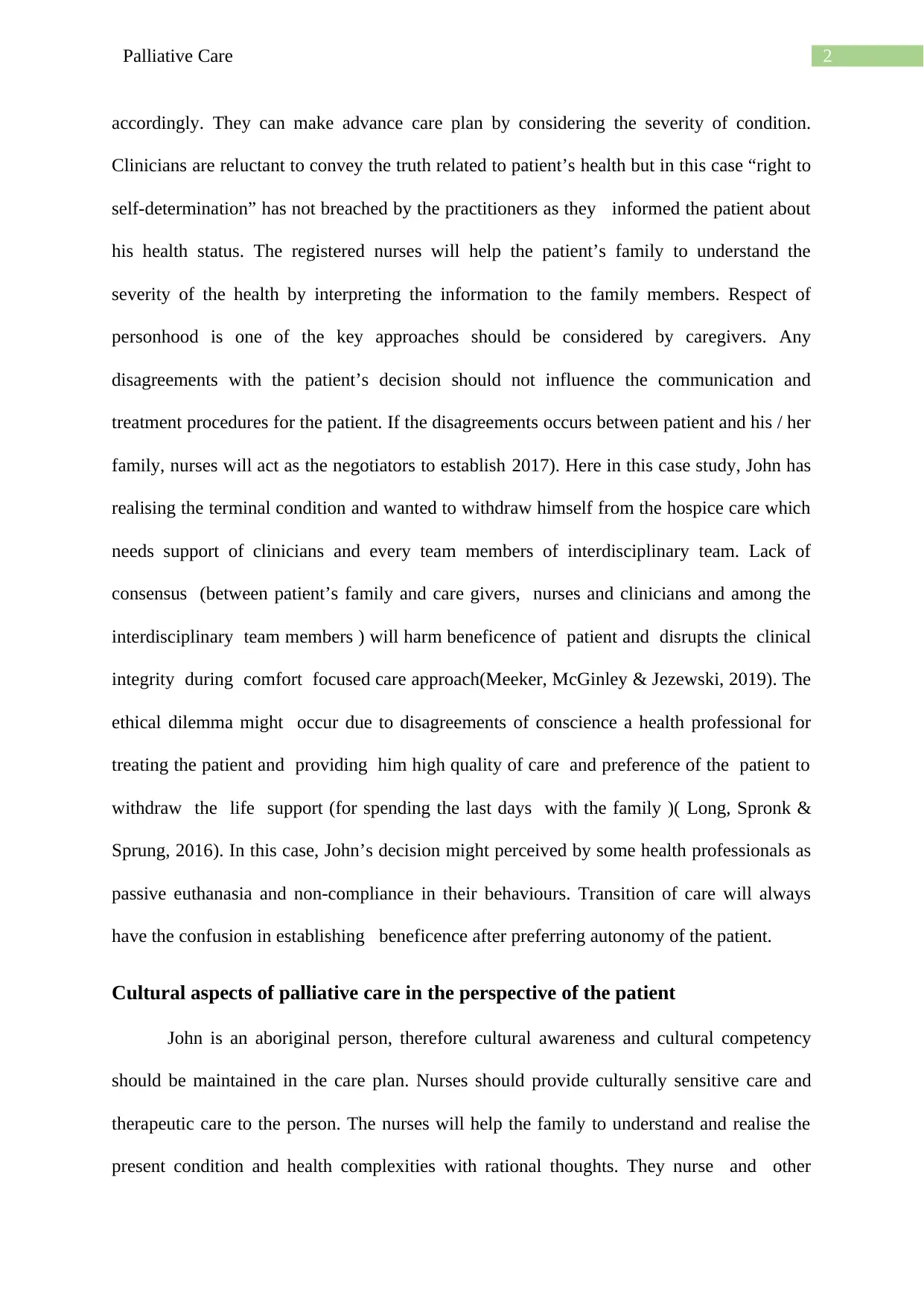
2Palliative Care
accordingly. They can make advance care plan by considering the severity of condition.
Clinicians are reluctant to convey the truth related to patient’s health but in this case “right to
self-determination” has not breached by the practitioners as they informed the patient about
his health status. The registered nurses will help the patient’s family to understand the
severity of the health by interpreting the information to the family members. Respect of
personhood is one of the key approaches should be considered by caregivers. Any
disagreements with the patient’s decision should not influence the communication and
treatment procedures for the patient. If the disagreements occurs between patient and his / her
family, nurses will act as the negotiators to establish 2017). Here in this case study, John has
realising the terminal condition and wanted to withdraw himself from the hospice care which
needs support of clinicians and every team members of interdisciplinary team. Lack of
consensus (between patient’s family and care givers, nurses and clinicians and among the
interdisciplinary team members ) will harm beneficence of patient and disrupts the clinical
integrity during comfort focused care approach(Meeker, McGinley & Jezewski, 2019). The
ethical dilemma might occur due to disagreements of conscience a health professional for
treating the patient and providing him high quality of care and preference of the patient to
withdraw the life support (for spending the last days with the family )( Long, Spronk &
Sprung, 2016). In this case, John’s decision might perceived by some health professionals as
passive euthanasia and non-compliance in their behaviours. Transition of care will always
have the confusion in establishing beneficence after preferring autonomy of the patient.
Cultural aspects of palliative care in the perspective of the patient
John is an aboriginal person, therefore cultural awareness and cultural competency
should be maintained in the care plan. Nurses should provide culturally sensitive care and
therapeutic care to the person. The nurses will help the family to understand and realise the
present condition and health complexities with rational thoughts. They nurse and other
accordingly. They can make advance care plan by considering the severity of condition.
Clinicians are reluctant to convey the truth related to patient’s health but in this case “right to
self-determination” has not breached by the practitioners as they informed the patient about
his health status. The registered nurses will help the patient’s family to understand the
severity of the health by interpreting the information to the family members. Respect of
personhood is one of the key approaches should be considered by caregivers. Any
disagreements with the patient’s decision should not influence the communication and
treatment procedures for the patient. If the disagreements occurs between patient and his / her
family, nurses will act as the negotiators to establish 2017). Here in this case study, John has
realising the terminal condition and wanted to withdraw himself from the hospice care which
needs support of clinicians and every team members of interdisciplinary team. Lack of
consensus (between patient’s family and care givers, nurses and clinicians and among the
interdisciplinary team members ) will harm beneficence of patient and disrupts the clinical
integrity during comfort focused care approach(Meeker, McGinley & Jezewski, 2019). The
ethical dilemma might occur due to disagreements of conscience a health professional for
treating the patient and providing him high quality of care and preference of the patient to
withdraw the life support (for spending the last days with the family )( Long, Spronk &
Sprung, 2016). In this case, John’s decision might perceived by some health professionals as
passive euthanasia and non-compliance in their behaviours. Transition of care will always
have the confusion in establishing beneficence after preferring autonomy of the patient.
Cultural aspects of palliative care in the perspective of the patient
John is an aboriginal person, therefore cultural awareness and cultural competency
should be maintained in the care plan. Nurses should provide culturally sensitive care and
therapeutic care to the person. The nurses will help the family to understand and realise the
present condition and health complexities with rational thoughts. They nurse and other
⊘ This is a preview!⊘
Do you want full access?
Subscribe today to unlock all pages.

Trusted by 1+ million students worldwide
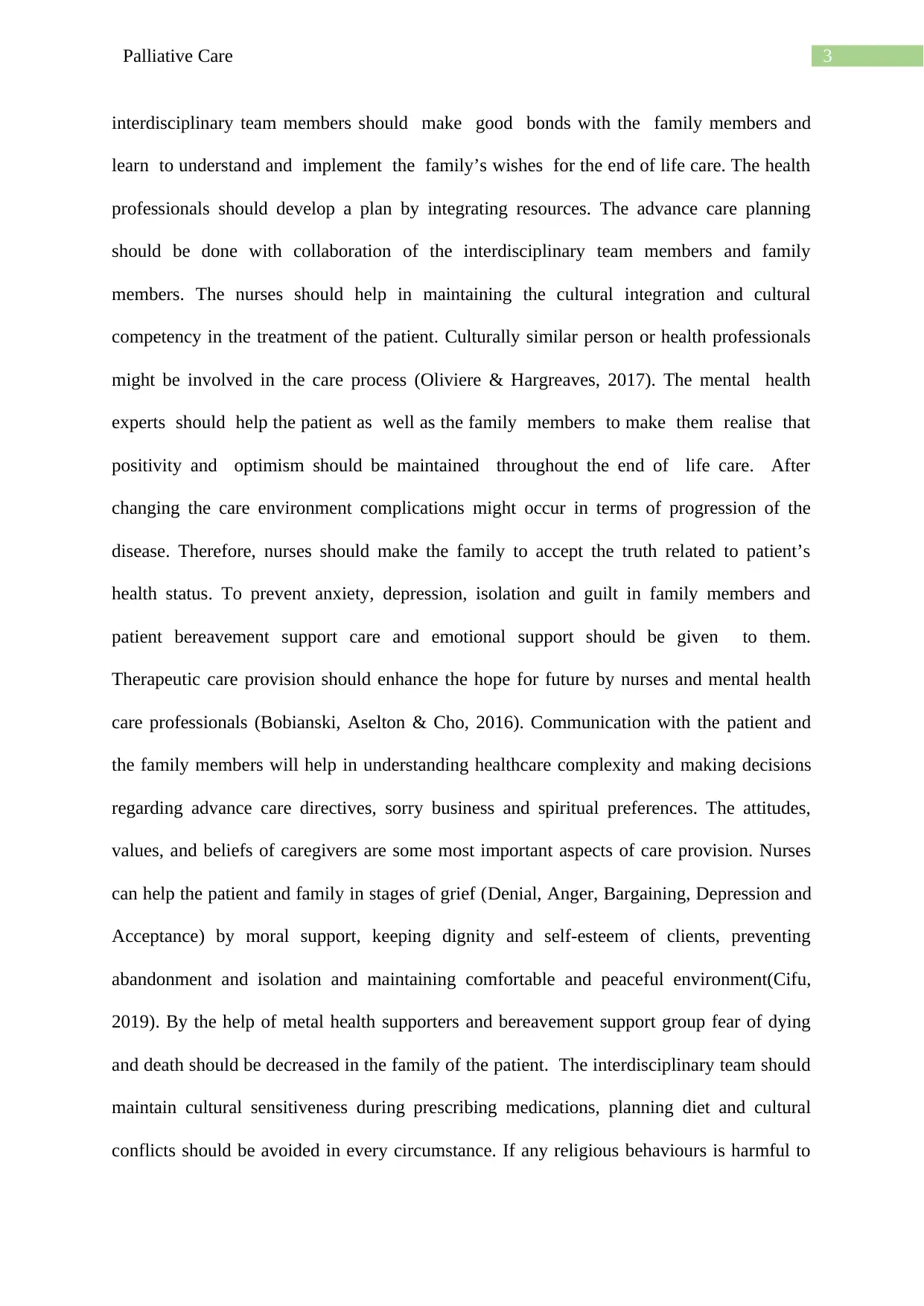
3Palliative Care
interdisciplinary team members should make good bonds with the family members and
learn to understand and implement the family’s wishes for the end of life care. The health
professionals should develop a plan by integrating resources. The advance care planning
should be done with collaboration of the interdisciplinary team members and family
members. The nurses should help in maintaining the cultural integration and cultural
competency in the treatment of the patient. Culturally similar person or health professionals
might be involved in the care process (Oliviere & Hargreaves, 2017). The mental health
experts should help the patient as well as the family members to make them realise that
positivity and optimism should be maintained throughout the end of life care. After
changing the care environment complications might occur in terms of progression of the
disease. Therefore, nurses should make the family to accept the truth related to patient’s
health status. To prevent anxiety, depression, isolation and guilt in family members and
patient bereavement support care and emotional support should be given to them.
Therapeutic care provision should enhance the hope for future by nurses and mental health
care professionals (Bobianski, Aselton & Cho, 2016). Communication with the patient and
the family members will help in understanding healthcare complexity and making decisions
regarding advance care directives, sorry business and spiritual preferences. The attitudes,
values, and beliefs of caregivers are some most important aspects of care provision. Nurses
can help the patient and family in stages of grief (Denial, Anger, Bargaining, Depression and
Acceptance) by moral support, keeping dignity and self-esteem of clients, preventing
abandonment and isolation and maintaining comfortable and peaceful environment(Cifu,
2019). By the help of metal health supporters and bereavement support group fear of dying
and death should be decreased in the family of the patient. The interdisciplinary team should
maintain cultural sensitiveness during prescribing medications, planning diet and cultural
conflicts should be avoided in every circumstance. If any religious behaviours is harmful to
interdisciplinary team members should make good bonds with the family members and
learn to understand and implement the family’s wishes for the end of life care. The health
professionals should develop a plan by integrating resources. The advance care planning
should be done with collaboration of the interdisciplinary team members and family
members. The nurses should help in maintaining the cultural integration and cultural
competency in the treatment of the patient. Culturally similar person or health professionals
might be involved in the care process (Oliviere & Hargreaves, 2017). The mental health
experts should help the patient as well as the family members to make them realise that
positivity and optimism should be maintained throughout the end of life care. After
changing the care environment complications might occur in terms of progression of the
disease. Therefore, nurses should make the family to accept the truth related to patient’s
health status. To prevent anxiety, depression, isolation and guilt in family members and
patient bereavement support care and emotional support should be given to them.
Therapeutic care provision should enhance the hope for future by nurses and mental health
care professionals (Bobianski, Aselton & Cho, 2016). Communication with the patient and
the family members will help in understanding healthcare complexity and making decisions
regarding advance care directives, sorry business and spiritual preferences. The attitudes,
values, and beliefs of caregivers are some most important aspects of care provision. Nurses
can help the patient and family in stages of grief (Denial, Anger, Bargaining, Depression and
Acceptance) by moral support, keeping dignity and self-esteem of clients, preventing
abandonment and isolation and maintaining comfortable and peaceful environment(Cifu,
2019). By the help of metal health supporters and bereavement support group fear of dying
and death should be decreased in the family of the patient. The interdisciplinary team should
maintain cultural sensitiveness during prescribing medications, planning diet and cultural
conflicts should be avoided in every circumstance. If any religious behaviours is harmful to
Paraphrase This Document
Need a fresh take? Get an instant paraphrase of this document with our AI Paraphraser
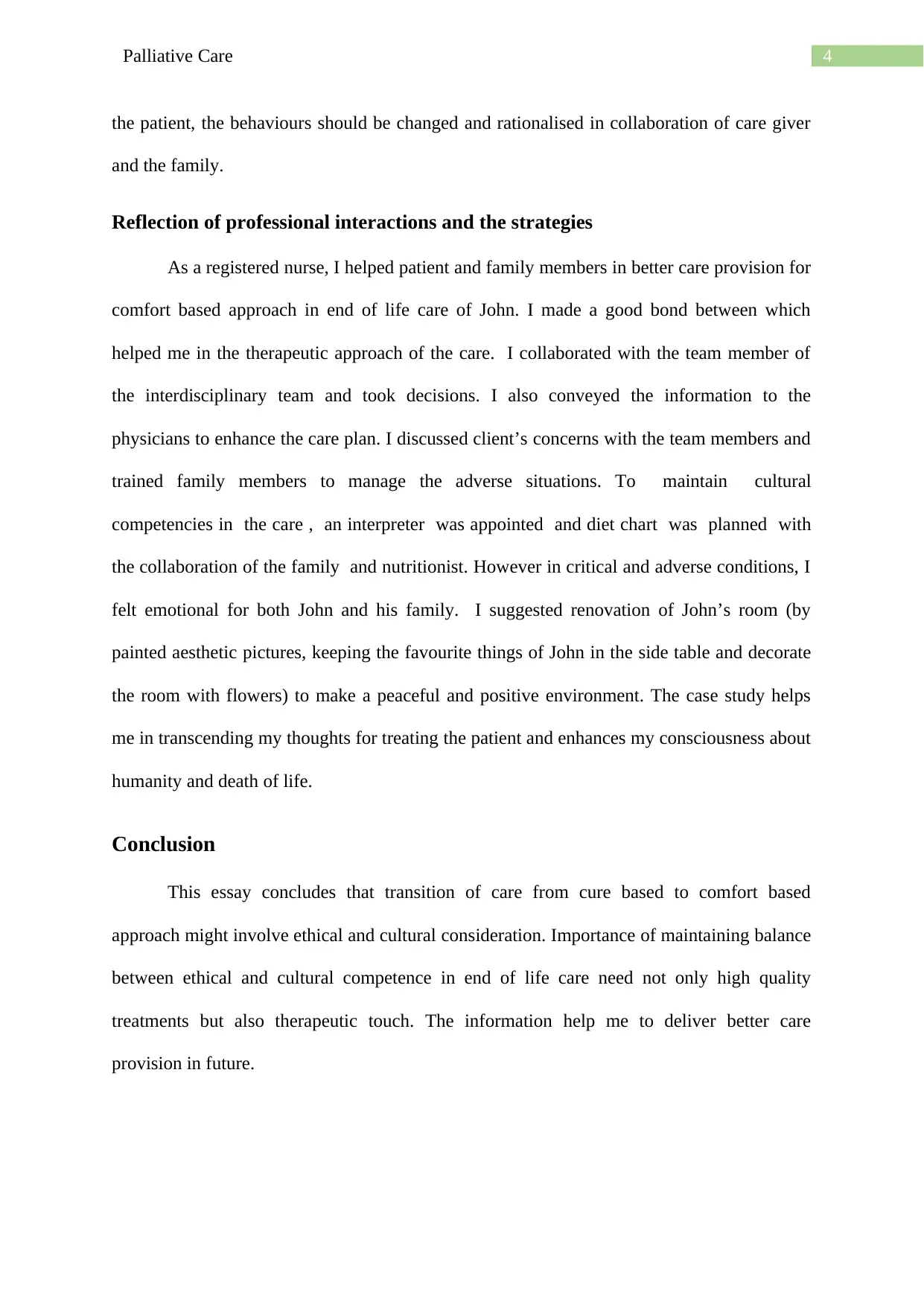
4Palliative Care
the patient, the behaviours should be changed and rationalised in collaboration of care giver
and the family.
Reflection of professional interactions and the strategies
As a registered nurse, I helped patient and family members in better care provision for
comfort based approach in end of life care of John. I made a good bond between which
helped me in the therapeutic approach of the care. I collaborated with the team member of
the interdisciplinary team and took decisions. I also conveyed the information to the
physicians to enhance the care plan. I discussed client’s concerns with the team members and
trained family members to manage the adverse situations. To maintain cultural
competencies in the care , an interpreter was appointed and diet chart was planned with
the collaboration of the family and nutritionist. However in critical and adverse conditions, I
felt emotional for both John and his family. I suggested renovation of John’s room (by
painted aesthetic pictures, keeping the favourite things of John in the side table and decorate
the room with flowers) to make a peaceful and positive environment. The case study helps
me in transcending my thoughts for treating the patient and enhances my consciousness about
humanity and death of life.
Conclusion
This essay concludes that transition of care from cure based to comfort based
approach might involve ethical and cultural consideration. Importance of maintaining balance
between ethical and cultural competence in end of life care need not only high quality
treatments but also therapeutic touch. The information help me to deliver better care
provision in future.
the patient, the behaviours should be changed and rationalised in collaboration of care giver
and the family.
Reflection of professional interactions and the strategies
As a registered nurse, I helped patient and family members in better care provision for
comfort based approach in end of life care of John. I made a good bond between which
helped me in the therapeutic approach of the care. I collaborated with the team member of
the interdisciplinary team and took decisions. I also conveyed the information to the
physicians to enhance the care plan. I discussed client’s concerns with the team members and
trained family members to manage the adverse situations. To maintain cultural
competencies in the care , an interpreter was appointed and diet chart was planned with
the collaboration of the family and nutritionist. However in critical and adverse conditions, I
felt emotional for both John and his family. I suggested renovation of John’s room (by
painted aesthetic pictures, keeping the favourite things of John in the side table and decorate
the room with flowers) to make a peaceful and positive environment. The case study helps
me in transcending my thoughts for treating the patient and enhances my consciousness about
humanity and death of life.
Conclusion
This essay concludes that transition of care from cure based to comfort based
approach might involve ethical and cultural consideration. Importance of maintaining balance
between ethical and cultural competence in end of life care need not only high quality
treatments but also therapeutic touch. The information help me to deliver better care
provision in future.
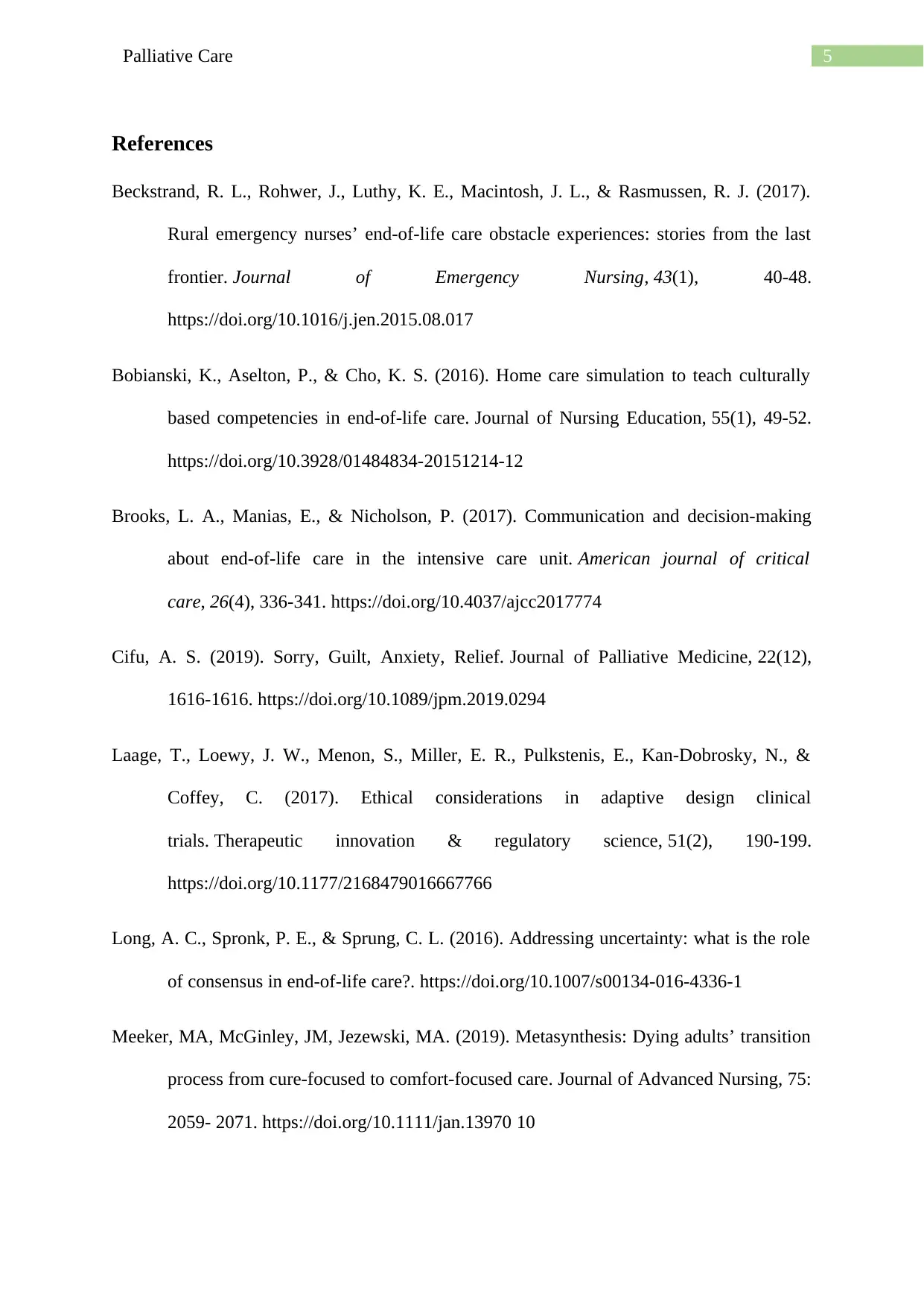
5Palliative Care
References
Beckstrand, R. L., Rohwer, J., Luthy, K. E., Macintosh, J. L., & Rasmussen, R. J. (2017).
Rural emergency nurses’ end-of-life care obstacle experiences: stories from the last
frontier. Journal of Emergency Nursing, 43(1), 40-48.
https://doi.org/10.1016/j.jen.2015.08.017
Bobianski, K., Aselton, P., & Cho, K. S. (2016). Home care simulation to teach culturally
based competencies in end-of-life care. Journal of Nursing Education, 55(1), 49-52.
https://doi.org/10.3928/01484834-20151214-12
Brooks, L. A., Manias, E., & Nicholson, P. (2017). Communication and decision-making
about end-of-life care in the intensive care unit. American journal of critical
care, 26(4), 336-341. https://doi.org/10.4037/ajcc2017774
Cifu, A. S. (2019). Sorry, Guilt, Anxiety, Relief. Journal of Palliative Medicine, 22(12),
1616-1616. https://doi.org/10.1089/jpm.2019.0294
Laage, T., Loewy, J. W., Menon, S., Miller, E. R., Pulkstenis, E., Kan-Dobrosky, N., &
Coffey, C. (2017). Ethical considerations in adaptive design clinical
trials. Therapeutic innovation & regulatory science, 51(2), 190-199.
https://doi.org/10.1177/2168479016667766
Long, A. C., Spronk, P. E., & Sprung, C. L. (2016). Addressing uncertainty: what is the role
of consensus in end-of-life care?. https://doi.org/10.1007/s00134-016-4336-1
Meeker, MA, McGinley, JM, Jezewski, MA. (2019). Metasynthesis: Dying adults’ transition
process from cure‐focused to comfort‐focused care. Journal of Advanced Nursing, 75:
2059- 2071. https://doi.org/10.1111/jan.13970 10
References
Beckstrand, R. L., Rohwer, J., Luthy, K. E., Macintosh, J. L., & Rasmussen, R. J. (2017).
Rural emergency nurses’ end-of-life care obstacle experiences: stories from the last
frontier. Journal of Emergency Nursing, 43(1), 40-48.
https://doi.org/10.1016/j.jen.2015.08.017
Bobianski, K., Aselton, P., & Cho, K. S. (2016). Home care simulation to teach culturally
based competencies in end-of-life care. Journal of Nursing Education, 55(1), 49-52.
https://doi.org/10.3928/01484834-20151214-12
Brooks, L. A., Manias, E., & Nicholson, P. (2017). Communication and decision-making
about end-of-life care in the intensive care unit. American journal of critical
care, 26(4), 336-341. https://doi.org/10.4037/ajcc2017774
Cifu, A. S. (2019). Sorry, Guilt, Anxiety, Relief. Journal of Palliative Medicine, 22(12),
1616-1616. https://doi.org/10.1089/jpm.2019.0294
Laage, T., Loewy, J. W., Menon, S., Miller, E. R., Pulkstenis, E., Kan-Dobrosky, N., &
Coffey, C. (2017). Ethical considerations in adaptive design clinical
trials. Therapeutic innovation & regulatory science, 51(2), 190-199.
https://doi.org/10.1177/2168479016667766
Long, A. C., Spronk, P. E., & Sprung, C. L. (2016). Addressing uncertainty: what is the role
of consensus in end-of-life care?. https://doi.org/10.1007/s00134-016-4336-1
Meeker, MA, McGinley, JM, Jezewski, MA. (2019). Metasynthesis: Dying adults’ transition
process from cure‐focused to comfort‐focused care. Journal of Advanced Nursing, 75:
2059- 2071. https://doi.org/10.1111/jan.13970 10
⊘ This is a preview!⊘
Do you want full access?
Subscribe today to unlock all pages.

Trusted by 1+ million students worldwide
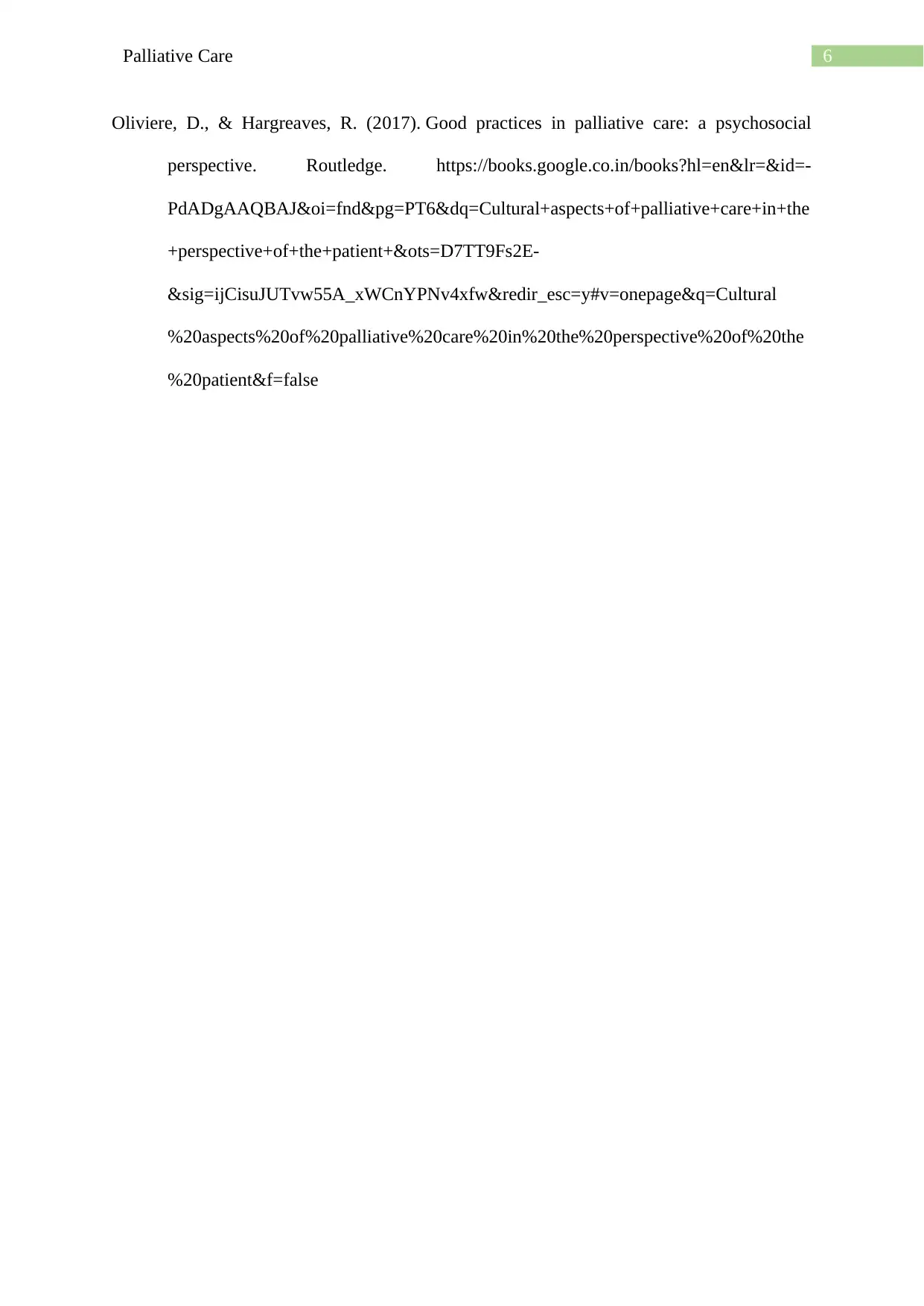
6Palliative Care
Oliviere, D., & Hargreaves, R. (2017). Good practices in palliative care: a psychosocial
perspective. Routledge. https://books.google.co.in/books?hl=en&lr=&id=-
PdADgAAQBAJ&oi=fnd&pg=PT6&dq=Cultural+aspects+of+palliative+care+in+the
+perspective+of+the+patient+&ots=D7TT9Fs2E-
&sig=ijCisuJUTvw55A_xWCnYPNv4xfw&redir_esc=y#v=onepage&q=Cultural
%20aspects%20of%20palliative%20care%20in%20the%20perspective%20of%20the
%20patient&f=false
Oliviere, D., & Hargreaves, R. (2017). Good practices in palliative care: a psychosocial
perspective. Routledge. https://books.google.co.in/books?hl=en&lr=&id=-
PdADgAAQBAJ&oi=fnd&pg=PT6&dq=Cultural+aspects+of+palliative+care+in+the
+perspective+of+the+patient+&ots=D7TT9Fs2E-
&sig=ijCisuJUTvw55A_xWCnYPNv4xfw&redir_esc=y#v=onepage&q=Cultural
%20aspects%20of%20palliative%20care%20in%20the%20perspective%20of%20the
%20patient&f=false
1 out of 7
Related Documents
Your All-in-One AI-Powered Toolkit for Academic Success.
+13062052269
info@desklib.com
Available 24*7 on WhatsApp / Email
![[object Object]](/_next/static/media/star-bottom.7253800d.svg)
Unlock your academic potential
Copyright © 2020–2026 A2Z Services. All Rights Reserved. Developed and managed by ZUCOL.





